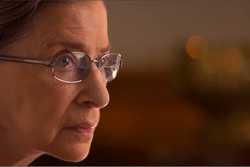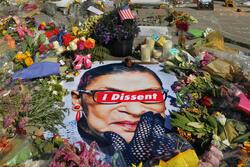Abolish the Death Penalty in Honor of Ruth Bader Ginsburg
Ruth Bader Ginsburg is a feminist icon, known for her fight against gender discrimination and continuous work to preserve liberty and equality in America. This month especially, while remembering all that RBG achieved, we should take the time to look into the lesser known parts of Justice Ginsburg’s long career, such as her fight against the death penalty. The death penalty in the United States has been a corrupt system since its inception: beginning with lynchings of Black Americans, and transforming into an institution that disproportionately affects minorities, kills innocent people, and irrevocably damages entire communities. Through her dedication to many movements, RBG taught me that protecting and uplifting the voices of the vulnerable is my duty as a human. The work to protect and uplift voices should extend to those on death row, awaiting a medieval punishment that shouldn’t exist in today’s society.
In 2018, during an interview at Columbia Law School, Justice Ginsburg declared that if she “were queen, there would be no death penalty.” She explained that the Supreme Court cases that gave her the most anxiety were the death penalty cases. Learning that one of my favorite Jewish feminists also opposed the death penalty is validating to my own beliefs, but when I learned of Ginsburg’s reasons for opposing the death penalty, I was initially caught by surprise; I hadn't come across her historical reasoning for abolition. While many people oppose the death penalty, few do it because of its reinforcement of old methods of sexism.
During Coker v. Georgia, RBG argued that death as a punishment for rape stems from the view that rape is a crime against the victim’s husband or father. When a woman was viewed as the property of the men in her life, her chastity was also the property of those men—therefore rape was a crime against the father or husband. The rapist would be killed because they violated the husband or father’s property, rather than the woman they hurt. Ginsburg wrote that this put women in a cage rather than on a pedestal.
Alongside old methods of sexism like those RBG pointed out, race also plays a role in this history: The death penalty was often carried out by lynch mobs who wrongfully accused Black men in order to kill them. Capital punishment in America was originally used as punishment for Black men accused of raping white women. Even today, black defendants with white alleged victims make up the majority of cases on death row. Keeping the system reinforces these systemic problems of sexism and racism.
This is an issue that feminists need to rally around. There is a three percent innocence rate on death row, meaning innocent people are wrongfully accused and sit awaiting execution and a three point five percent botched execution rate, where the administration of the death penalty (usually during lethal injections) goes wrong, and the prisoner is tortured before their death. Above all, the death penalty disproportionately affects minorities.
Although Ginsburg wasn’t on the Supreme Court during Coker v. Georgia, she’s been on the court during other capital punishment cases. One notable case was Moore v. Texas, where Bobby James Moore was accused of shooting a store clerk in Texas. Moore later argued that because he was intellectually disabled, he shouldn’t be executed. Here, Ginsburg delivered the opinion of the court. She argued that whether someone is intellectually disabled needed to be decided by medical experts when on death row. This decision meant life for Bobby Moore.
Contemporary activists can learn from RBG’s other interactions with capital punishment cases. In 2015, Ginsburg joined the dissent for Glossip v. Gross, agreeing that the death penalty violates the Eighth Amendment’s ban on cruel and unusual punishments. Ginsburg was a fan of opera, and in 2015, she gave a speech about opera and the death penalty and discussed Dead Man Walking, an opera about a man on death row. She concluded that the death penalty is declining in America: nineteen states have now abolished it, and cases of its usage are decreasing in the states where it remains legal.
This decline may be attributed to the work of Ginsburg and peers, and to the immense waste that happens due to the death penalty. The government squanders exorbitant amounts of money on the death penalty. The average death penalty case costs $1.26 million. That’s $1.26 million that could be spent reforming prisons, creating rehabilitation centers, bettering public education, and actually benefitting society. Incredible activist organizations are leading the current fight against the oppressive system of the death penalty: groups like the Death Penalty Information Center and the Innocence Project currently petition the government to abolish the death penalty. The Death Penalty Information Center spreads awareness of the current death row cases, and has a comprehensive database of American death penalty history. The Innocence Project focuses on helping post-conviction people off death row.
When Jewish feminists rally around an issue, they can create real change. The death penalty has no place in our laws. It has no place in our society and it should have no place here. If a government wants to teach its people that killing is wrong, it cannot do so by killing its people. The constitution does not contain an “except for murderers” clause. Everyone is guaranteed the right to life. The death penalty institution doesn’t just need change, it needs to be abolished; Ruth Bader Ginsburg teaches us that institutions that have rotten roots need to be uprooted.
This piece was written as part of JWA’s Rising Voices Fellowship.








Excellent article and a fitting tribute to the great RBG!!
So eloquently written!Jewish feminists are so important!!
Ellie:
White murderers are twice as likely to be executed as are black murderers
From 1977-2012, white death row murderers have been executed at a rate 41% higher than are black death row murderers, 19.3% vs 13.7%, respectively.
"There is no race of the offender / victim effect at either the decision to advance a case to penalty hearing or the decision to sentence a defendant to death given a penalty hearing."
For the White–Black comparisons, the Black level is 12.7 times greater than the White level for homicide, 15.6 times greater for robbery, 6.7 times greater for rape, and 4.5 times greater for aggravated assault.
As robbery/murder and rape/murder are, by far, the most common death penalty eligible murders, the multiples will be even greater, as one would expect.
much more, here
RACE & THE DEATH PENALTY: A REBUTTAL TO THE RACISM CLAIMS
at prodpinnc
The evidence the author includes plays a meaningful role throughout the article-particularly the statistics and the supreme court cases. Extremely thought provoking, insightful, and well-written piece!
amazing article🙌🙌